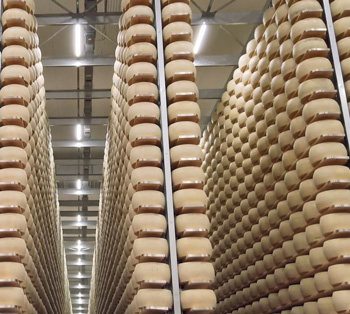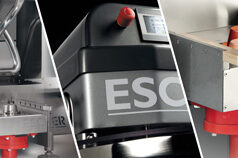 IRB 6620 è il robot industriale potente e flessibile divenuto protagonista di una fase della produzione di Grana Padano particolarmente pesante e insidiosa per l’uomo
IRB 6620 è il robot industriale potente e flessibile divenuto protagonista di una fase della produzione di Grana Padano particolarmente pesante e insidiosa per l’uomo
Latteria Sociale Ca’ De’ Stefani, cooperativa ultracentenaria con sede a Vescovato (CR), ha recentemente inaugurato un impianto di automazione unico nel settore caseario in grado di alleggerire i dipendenti dalle mansioni più faticose.
Grazie alla sapiente opera di progettazione e integrazione dell’azienda C.A.R. di Turbigo, ABB entra a far parte dell’impianto caseario di Latteria Sociale Ca’ De’ Stefani con l’IRB 6620, robot industriale potente e flessibile divenuto protagonista di una fase della produzione di Grana Padano particolarmente pesante e insidiosa per l’uomo.
La sfida
L’azienda avvertiva la necessità di aumentare gli standard di sicurezza ed alleggerire i propri dipendenti da mansioni faticose dovute allo spostamento delle pesanti forme di Grana Padano in spazi ristretti.
La soluzione
 Inserimento nel processo produttivo dell’IRB 6620, robot antropomorfo dotato di libertà di movimento su 6 assi. Con una capacità di carico utile al polso di 150 kg e un’area operativa di 2,2 m riesce ad essere al tempo stesso potente e preciso in spazi ristretti.
Inserimento nel processo produttivo dell’IRB 6620, robot antropomorfo dotato di libertà di movimento su 6 assi. Con una capacità di carico utile al polso di 150 kg e un’area operativa di 2,2 m riesce ad essere al tempo stesso potente e preciso in spazi ristretti.
Potente e gentile, IRB 6620 brilla anche nel settore alimentare.
“La sfida era ambiziosa” afferma Sebastian Torno, Direttore Tecnico di C.A.R., l’integratore che ha fatto da ponte tra ABB e Latteria Ca’ De’ Stefani “si trattava di trovare una soluzione meccanizzata che avesse come tratti distintivi potenza e al tempo stesso precisione e delicatezza in uno spazio ristretto”.
La scelta è ricaduta sul robot industriale IRB 6620, utilizzato in larga scala nel settore automotive, ma perfettamente adattabile ad un’applicazione in campo alimentare. L’indice di protezione del braccio robotizzato e i materiali utilizzati per le parti che vengono a contatto con il prodotto, ne fanno un robot totalmente compatibile con una linea di produzione Food & Beverage. La complessa fase di progettazione e simulazione portata avanti da C.A.R., ha portato alla soluzione adottata oggi con soddisfazione da Ca’ De’ Stefani: un’isola produttiva costruita ex novo in cui il robot IRB 6620 preleva le forme dagli scaffali, le rivolta per permettere che si concluda l’asciugatura e le consegna al passaggio successivo.
“L’adattività del software ci ha permesso di progettare il movimento del braccio robotico che ora in modo intelligente si posiziona e riconosce le differenze tra i prodotti da prelevare e spostare” racconta Giacomo Ferretti, System Engineering di C.A.R.
The flexibility and power of an ABB robot at Latteria Ca’ De’ Stefani
IRB 6620 is a powerful and flexible industrial robot that has become the protagonist of a particularly heavy and hazardous phase of Grana Padano production
Latteria Sociale Ca’ De’ Stefani, a century-old cooperative based in Vescovato (CR), recently inaugurated a unique automation system in the dairy sector that can relieve employees of the most tiring tasks.
Thanks to the skilful design and integration work of the Turbigo-based company C.A.R., ABB has joined the Latteria Sociale Ca’ De’ Stefani dairy plant with the IRB 6620, a powerful and flexible industrial robot that has become the protagonist of a particularly heavy and hazardous phase of Grana Padano production.
The challenge
The company needed to increase safety standards and relieve its employees of the tiring tasks involved in moving the heavy wheels of Grana Padano cheese in confined spaces.
The solution
Insertion into the production process of IRB 6620, an anthropomorphic robot with freedom of movement on 6 axes. With a payload capacity of 150 kg at the wrist and an operating area of 2.2 m, it manages to be both powerful and precise in confined spaces.
Powerful and gentle, the IRB 6620 also shines in the food sector.
“The challenge was ambitious,” says Sebastian Torno, Technical Director of C.A.R., the integrator that acted as a bridge between ABB and Latteria Ca’ De’ Stefani, “it was a matter of finding a mechanized solution that had power and at the same time precision and gentleness in a small space as its distinguishing features.”
The choice fell on the IRB 6620 industrial robot, used on a large scale in the automotive sector, but perfectly adaptable to an application in the food sector. The protection index of the robotic arm and the materials used for the parts that come into contact with the product make it a robot that is fully compatible with a Food & Beverage production line. The complex design and simulation phase carried out by C.A.R., has led to the solution adopted today with satisfaction by Ca’ De’ Stefani: a production island built from scratch where the IRB 6620 robot picks up the shapes from the shelves, turns them over to allow the drying process to be completed and delivers them to the next step.
“The adaptability of the software has allowed us to design the movement of the robotic arm, which now intelligently positions itself and recognizes the differences between the products to be picked up and moved,” says Giacomo Ferretti, System Engineering at C.A.R.











